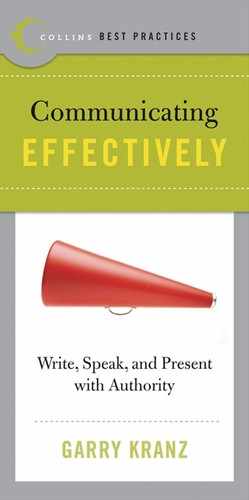You are now ready to put what you have learned from this book into practice. Use this section as a review guide:
CHAPTER 1.
COMMUNICATING CLEARLY IN WRITING
- The ability to write well is essential to advancing your managerial career.
- Research and planning is the first step to crafting a well-written message.
- Whether you are writing a brief e-mail or formal business report, correct grammar, accurate language, and good manners are critical.
- Clarity and simplicity are the cornerstone of good writing. Buzzwords and jargon should be eliminated.
- Understanding whom you are writing for and why you are writing—to inform or to persuade—helps target written communications more effectively.
- Revising and editing are the last—but most crucial—steps in the writing process.
CHAPTER 2.
DIGITAL COMMUNICATION
- Business e-mails should be treated with the same care as other forms of written communication: attention to details and grammar is paramount.
- The rules of e-mail etiquette are simple: be courteous, reply to e-mails promptly, err on the side of a formal tone, limit use of abbreviations, double-check spelling of recipients and their addresses.
- E-mail and instant messaging should be used only for company business; employees should be discouraged from sending and receiving personal or inappropriate e-mails at work.
CHAPTER 3.
PRECISION ON PAPER
- Internal memorandums, or memos, are brief documents used to impart information within a select group of people.
- Memos consist of a heading—date, recipients, sender, and subject line—and a body of text.
- All business letters are formal by nature and are generally written either to notify, request, respond, or persuade.
- An effective business letter is well structured—with a proper greeting, body of text and closing—and correctly formatted (either in block format or modified block format).
- Reports are formal, lengthy documents drafted to inform readers, apprise them of a current situation, or recommend actions.
- A credible report is characterized by objectivity and reliance on facts.
- Recorded meeting minutes should be free of persuasion, opinion, or analysis, and should be accurate, succinct, and straightforward.
CHAPTER 4.
ORAL COMMUNICATION
- It is essential for managers to cultivate good speaking skills.
- Nonverbal cues, such as your gestures, facial expressions, and posture, express what your words might not.
- The best form of nonverbal communication is to listen attentively.
- At no time are communication skills more critical than when you are giving feedback to an employee.
- Answering the phone and leaving voice-mail messages requires politeness and professionalism at all times.
- The key to oral presentations is thorough preparation. Write, revise, and practice your script.
..................Content has been hidden....................
You can't read the all page of ebook, please click here login for view all page.
